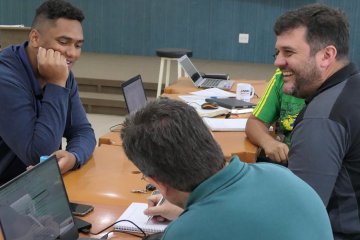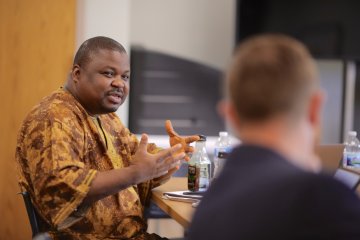How to Grow as a Missiologist
 Travis Myers
Travis MyersOne of my former college students who passed through Bethlehem College & Seminary before we offered a cross-cultural ministry concentration has been turned on to mission studies by one of the professors at the seminary he now attends. Brandon, who earned a degree in biblical and theological studies at BCS, asked me how he could grow as a missiologist. What I told him would apply to any US American Christian who has already been well grounded in sound doctrine and bible study skills, those things providing the essential lense through which to evaluate the contemporary global situation and formulate a faithful response. Here is an expanded version of what I told him.
Keep studying God’s marvelous and mixed up world while consciously making connections between what’s going on and the missio Dei revealed in Scripture. Be a student of globalization, especially the amazing and heart wrenching flow of migrant peoples around the world. Get to know as many people involved in cross-cultural ministry as possible. Cultivate meaningful cross-cultural relationships for yourself in the city where you live. Dip into cross-cultural immersion experiences as you have opportunity, like enjoying an Asian supermarket, visiting a Somali coffee shop, or going bowling with hipsters. Read The Economist weekly. Follow BBC on Twitter. Check out Al-Jazeera and Pravda online occasionally to get a different perspective. Watch popular international films and parse them for their worldview assumptions and assertions.
“Be a student of globalization, especially the amazing and heart wrenching flow of migrant peoples around the world. Get to know as many people involved in cross-cultural ministry as possible.”
Stay abreast of controversial issues in missions, especially regarding strategy, and apply rigorous theological thinking to them. That is very needful. The Reader for the Perspectives on the World Christian Movement course and the journal Evangelical Missions Quarterly provide discerning readers an introduction to some of these topics. Craig Ott and Stephen Strauss’s Encountering Theology of Mission: Biblical Foundations, Historical Developments, and Contemporary Issues provides a judicious assesment of several topics from an evangelical and ecclesiocentric perspective while introducing readers to a range of missiological literature.
You should learn about issues involved with ministry among the materially poor and international development. Start by reading Steve Corbett and Brian Fikkert’s When Helping Hurts: How to Alleviate Poverty without Hurting the Poor and Yourself but don’t avoid secular literature on the topic. Don’t go on a short term ministry trip without first reading David Livermore’s Serving with Eyes Wide Open: Doing Short-Term Missions with Cultural Intelligence and Tim Tennent’s “Six Dangerous Questions” to ask before doing STM.
Other books that I include in my courses and recommend to students include Tim Tennent’s Invitation to World Missions: A Trinitarian Missiology for the Twenty-first Century; the Bruce Ashford edited Theology and Practice of Mission: God, the Church, and the Nations; Paul Borthwick’s Western Christians in Global Mission: What’s the Role of the North American Church; Miriam Adeney’s Kingdom without Borders: The Untold Story of Global Christianity; Robert Wuthnow’s Boundless Faith: The Global Outreach of American Churches; and, of course, Operation World.
In addition, you might peruse the websites of both the Lausanne Movement and the World Evangelical Alliance for papers and presentations by Christian leaders from around the world. The CrossfortheNations.org site offers from a “young, reformed, and restless” perspective podcasts that speak to the why and how of missions to unreached people groups.
For advanced study, see Landmark Essays in Mission and World Christianity, edited by Robert Gallagher and Paul Hertig; Mark Noll’s The New Shape of World Christianity: How American Experience Reflects Global Faith; as well as Globalizing Theology: Belief and Practice in an Era of World Christianity, edited by Craig Ott and Harold Netland.
If you are interested in the history of missions – as you should be (!) – then also see Dana Robert’s Christian Mission: How Christianity Became a World Religion; Ruth Tucker’s biographical approach in From Jerusalem to Irian Jaya; the two fascinating and seminal books by Andrew Walls, The Missionary Movement in Christian History and The Cross-Cultural Process in Christian History; and, finally, The Great Commission: Evangelicals and the History of World Missions, edited by Martin Klauber and Scott Manetsch. The last book noted concludes with a few chapters surveying the contemporary world Christian scene per continent and a wonderful chapter by D.A. Carson on the theology of missions.
Travis Myers is assistant professor of church history and mission studies at Bethlehem College & Seminary. He’s also a member of the editorial board for the Journal of Global Christianity published by Training Leaders International. He and his wife, Susan, served as missionary faculty members at the Cameroon Baptist Theological Seminary.



